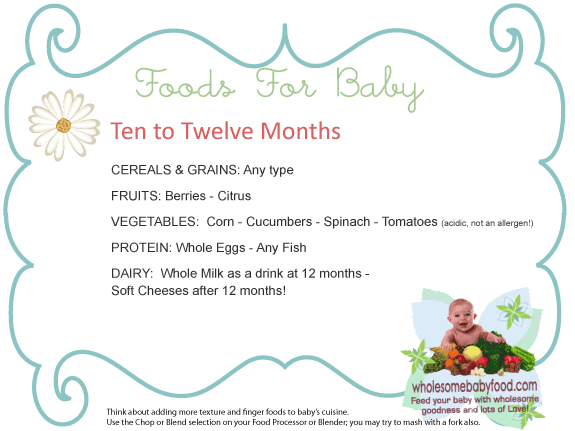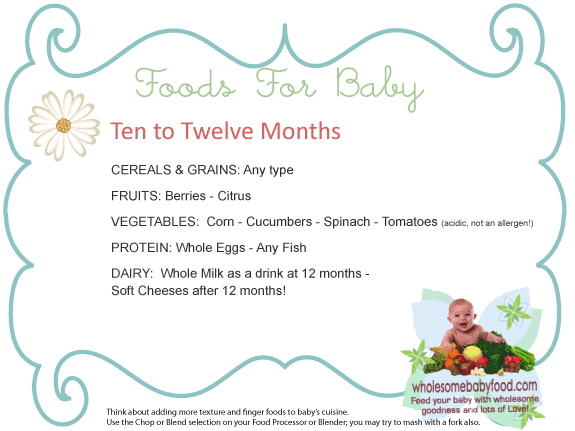Solid Foods for Your 10-12 Month old Baby – The Food World Awaits!
Your 10-12 Month old baby has probably found a few foods that are truly favorite foods. At this point, chunkier “table foods” are a big part of his meals and he may not like those thinner purees anymore. Your little one may really begin to refuse to eat but it is still unlikely that she is a Picky Eater. Children won’t truly develop “picky eating” until sometime into the Toddler years, if at all. Your baby’s refusal to eat even favorite foods may be attributed to many things. She may simply be too busy to stop exploring her world and she may get quite miffed when you put her in her highchair to eat. With her independence growing, she may also begin to show preferences for certain foods and Refuse to be Spoon Fed.
![]() Take heart – while this stage of eating may be a bit frustrating, it won’t last forever. Giving your baby the opportunity to choose the foods she wants to eat and how much she wants to eat is important; let your baby be your guide and try not to get frustrated. As long as you are offering a balanced diet of fruits, veggies and protein, she will be getting all the nutrition she needs!
Take heart – while this stage of eating may be a bit frustrating, it won’t last forever. Giving your baby the opportunity to choose the foods she wants to eat and how much she wants to eat is important; let your baby be your guide and try not to get frustrated. As long as you are offering a balanced diet of fruits, veggies and protein, she will be getting all the nutrition she needs!
What to Eat at 10-12 Months of Age?
As with your 8-10 month old, continue to expand baby’s palate with new flavors. Experiment with new spices (8 months old) and new flavorful combinations. Offer your little foodie a yummy chicken curry for example.
Pasta, veggies, and fruit should all be soft cooked and possibly mashed with a fork or masher. (Bananas need only be mashed.)
Meats and proteins such as egg yolk, should be cooked and pureed or chopped into small soft bits. If offering Tofu, you need not cook it first.
Remember, baby will not have molars until sometime around the 12-18 month age range. Foods should be easily mashed between the gums.
How much will your 10 month – 12 month old baby eat?
Your 10 month old baby will have a varied appetite. Some days you’ll think there is not enough food in the world to fill her belly while other days you’ll wonder if she will ever eat another bite. As with the 8-10 month old baby, because you are likely offering her more finger food selections or thicker/chunkier foods, the amount of food eaten appears smaller.
What to Eat at 10-12 Months of Age?AGE/STAGE – Ten to Twelve (10-12) Months oldCEREALS & GRAINSAll grains and pastas! Create your own baby pasta salad with favorite veggies and cheeses. FRUITSBegin making your own fruit combinations once baby has had several fruits without any reaction(s). Go slowly if introducing citrus fruits now and watch for possible reactions to the acidity. VEGGIESSoft cooked veggies make for great beginner Baby Finger Foods. Try mixing up a soft cooked and diced veggie medley now. Slowly introduce tomato and other acidic foods; watch for reactions to the acidity. MEATS & PROTEINBetween 10-12 months old you should be able to introduce white-fleshed fish (if you have not already done so) and other types of fish. Bake fish plain or breaded and offer with steamed veggies for a healthy meal. Salmon makes a great meal for your baby! DAIRYBy 12 months old, baby may be weaning from breast milk or formula to whole milk. Help ease the change by offering ½ breast milk and ½ milk or ½ milk and ½ formula mixed during the first few days of the transition. Breast-fed babies may also be weaning now but remember, there is no reason to wean your breastfed baby until your baby is ready. |
![]() Click here for a printable “no ad” version of the complete solid food introduction chart
Click here for a printable “no ad” version of the complete solid food introduction chart
![]() New Breast-Fed Baby Growth Charts from the World Health Organisation – Reflecting Breast-Fed Babies Growth Patterns
New Breast-Fed Baby Growth Charts from the World Health Organisation – Reflecting Breast-Fed Babies Growth Patterns
The charts presented are general guidelines with solid baby foods that are age appropriate. They may seem somewhat conservative in nature compared to guidelines from other sources. We show age-ranges for different foods and we have researched and compiled these charts from various medical authorities such as private pediatricians, the AAP, the AAFP and the WHO. Feel free to print the chart and ask your Pediatrician about the listings and recommendations. Our visitors say their pediatricians are impressed with our Chart’s suitability and accuracy of listings.
![]() Remember, always consult with your pediatrician regarding introducing solid foods to your baby and specifically discuss any foods that may pose allergy risks for your baby.
Remember, always consult with your pediatrician regarding introducing solid foods to your baby and specifically discuss any foods that may pose allergy risks for your baby.
Suggested Daily “Milk” Intakes for Babies age 0 to 12 months
- 0-3 Months of age: Breastfeed every 1-3 hours or Formula 18-40 ounces
- 4-5 Months of age: Breastfeed every 2-4 hours or Formula 24-45 ounces
- 6-8 Months of age: Breastfeed every 3-4 hours or Formula 24-37 ounces
- 9-12 Months of age: Breastfeed every 4-5 hours or Formula 24-31 ounces
Whole Cow Milk, as a drink, should not be introduced until 12 months of age. Learn about Introducing Yogurt and Feeding Cheese to your baby.
Table compiled from Merck Source



